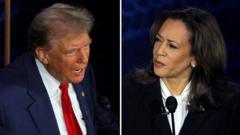Now, as for the rest of the article:
In a striking development following his re-election, President Donald Trump has enacted a sweeping order revoking the security clearances of several prominent political figures, including his 2024 election rival, Kamala Harris, and former Secretary of State Hillary Clinton. This decisive action aligns with Trump's previous statements where he cited national interest as the basis for limiting access to classified information.
This follows Trump’s earlier decision to revoke the access of President Joe Biden, reinforcing a trend where former presidents and top officials are often afforded courtesy clearances. Nevertheless, Trump's directive specifically targets a wide array of figures from various political backgrounds. His memorandum not only affects former adversaries but also top officials from the Biden administration, notably Secretary of State Antony Blinken, National Security Advisor Jake Sullivan, and Deputy Attorney General Lisa Monaco, stripping them of their capacity to access classified materials crucial for national governance.
The ramifications of these revocations, while primarily symbolic for some, could present significant obstacles for legal professionals involved in cases against Trump. This includes attorneys such as New York's Attorney General Letitia James, who has pursued legal actions against Trump's businesses, and Manhattan District Attorney Alvin Bragg, who successfully prosecuted Trump related to the hush money case.
Trump also criticized Republicans who diverged from his agenda, revoking clearances for former Representatives Liz Cheney and Adam Kinzinger, who were key participants in the investigation of the January 6 Capitol riot. The order has been met with derision from many affected, with Alexander Vindman asserting that Trump's actions hold little impact, given his lack of active clearance.
Legal opponents have responded defiantly on social media, with Norm Eisen, an attorney integral to several lawsuits against the former administration, stating that this only motivates him to escalate his efforts. Trump's previous revocations, including those of various intelligence officials accused of alleged biases in the 2020 electoral process, underscore a growing culture of political retribution.
This newest chapter of retribution in America’s political saga not only highlights the contentious divisions within contemporary governance but also raises critical questions about the implications for national security and political discourse. As the landscape continues to shift, many are left wondering how these actions will reverberate leading up to the next election cycle and beyond.
In a striking development following his re-election, President Donald Trump has enacted a sweeping order revoking the security clearances of several prominent political figures, including his 2024 election rival, Kamala Harris, and former Secretary of State Hillary Clinton. This decisive action aligns with Trump's previous statements where he cited national interest as the basis for limiting access to classified information.
This follows Trump’s earlier decision to revoke the access of President Joe Biden, reinforcing a trend where former presidents and top officials are often afforded courtesy clearances. Nevertheless, Trump's directive specifically targets a wide array of figures from various political backgrounds. His memorandum not only affects former adversaries but also top officials from the Biden administration, notably Secretary of State Antony Blinken, National Security Advisor Jake Sullivan, and Deputy Attorney General Lisa Monaco, stripping them of their capacity to access classified materials crucial for national governance.
The ramifications of these revocations, while primarily symbolic for some, could present significant obstacles for legal professionals involved in cases against Trump. This includes attorneys such as New York's Attorney General Letitia James, who has pursued legal actions against Trump's businesses, and Manhattan District Attorney Alvin Bragg, who successfully prosecuted Trump related to the hush money case.
Trump also criticized Republicans who diverged from his agenda, revoking clearances for former Representatives Liz Cheney and Adam Kinzinger, who were key participants in the investigation of the January 6 Capitol riot. The order has been met with derision from many affected, with Alexander Vindman asserting that Trump's actions hold little impact, given his lack of active clearance.
Legal opponents have responded defiantly on social media, with Norm Eisen, an attorney integral to several lawsuits against the former administration, stating that this only motivates him to escalate his efforts. Trump's previous revocations, including those of various intelligence officials accused of alleged biases in the 2020 electoral process, underscore a growing culture of political retribution.
This newest chapter of retribution in America’s political saga not only highlights the contentious divisions within contemporary governance but also raises critical questions about the implications for national security and political discourse. As the landscape continues to shift, many are left wondering how these actions will reverberate leading up to the next election cycle and beyond.

















